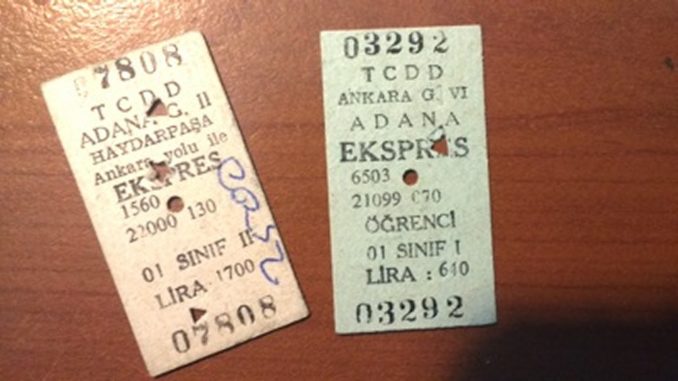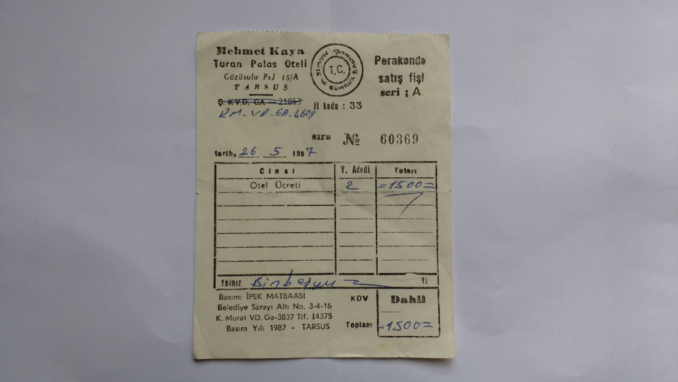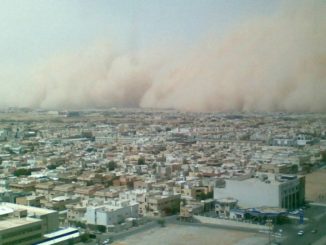
© Always Worth Saying, Going Postal 2019
I’ve settled myself down in modest but adequate lodgings in Istanbul and get into the habit of a daily stroll just after sun down.
It’s a five minute walk down to the Bosphorus where a bridge across the Golden Horn runs from Eminonu to Galata. It sways gently on its pontoons as I walk along. It’s wide enough to allow a row of shops along one side. It is dark and the street light very faint. It is warm, cotton sleeved weather, there is no sense of menace and the strollers and hawkers seem completely relaxed. There are all the sizzles and spits of food being prepared so I pop into a canteen and squeeze onto bench with other hungry diners who are dressed in the ubiquitous grey suits and collarless white shirts of the artisans and lower middle classes. There’s no sign of a menu or even a knife and fork. I eat what is put in front of me with my hands.
On the way back to my lodgings I buy a little bag of ball bearings for the next day.
And then in a narrow lane near to my hotel I’m stopped by a spiv. Everybody wears a uniform and his was dark glasses, jeans and western sports shoes. He reminds me that digital watches are the ‘in thing’ and a young travelling gentleman with space in his blue Berghaus might sense an opportunity. He offered me half a dozen at a special, end of the day, best friend’s, neighbour’s cousin price. How could I resist?
From Istanbul it’s a short ferry hop from Europe to Asia, from Topkapi to Haydarpasa, with Florence Nightingale’s hospital up on the hilltop, not to be confused with an equally impressive building on the previous hilltop which is the Harem.
Early the next morning I entered the ferry stop by dropping a ball bearing into the turnstile.
On the way across the channel small boys dressed as admirals do a circuit of the deck handing out sweets and then, on a second circuit, take a few coins or the returned uneaten sweets. By this time we are alongside the jetty next to Haydarpasa railway station and are invited to step down the gang plank and set foot in Asia.
Thereabouts is the bus station and if you are well dressed, polite, clean shaven and with little luggage, then a blind eye is turned and you can take a Turkish Army officer’s bus for the ten hour trip to Ankara.
These busses were air conditioned with complimentary newspapers, mineral water and towels passed around by Turkish Wrens while the officers sat with attaché cases chained to their wrists . There were intermediate comfort and meal stops at roadside restaurants.
At the time Turkey had a military president, General Evren, and a civilian but unelected Prime Minister called Mr Ozal. If you need to know what Mr Ozal politics were, well, they told me that Mrs Thatcher was an Ozalite. There was a very large military presence everywhere, both regular soldiers and the military police, the Asiz, recognisable by the red bandannas around their helmets.
There was also an active secret police, armed with concealed coshes and armbands, snatching criminals and political suspects as they saw fit. Arrests happened very quickly and very frequently. As they were led away, captured suspects made a dreadful and continual howling noise that I can still hear to this day.
Successive civilian governments had been chaotic with the army stepping in via military coup to maintain order. This meant that the brightest and the best went into the military rather than the professions, politics or the civil service. The then Turkish officer corps was of a very high standard indeed.
Their neighbourhood was difficult. To the west, the hated Greeks and Warsaw Pact Bulgars. To the east, a Kurdish insurgency within Turkey. Syria to the south and the Soviet Union to the North East. The other two troublesome neighbours, Iran and Iraq, were at war with each other.
Leaving Istanbul the motorway was crowded, not just with vehicles but with livestock grazing on the central reservation and boys running between the cars vending newspapers and sweets.
The Turkish tabloids enjoyed a good spread of naked young ladies, with their nipples blacked out for the purpose of modesty, which, if anything made them look even more immodest. As well as regional news if bloodshed and hostages the papers also enjoyed a bit of foreign scandal and I was able to read, long before they were made public in England, of the peccadilloes of some in British public life. There was also a story, all these years later still the wrong side of a D notice, about a bombing campaign in the Uk using stolen industrial explosives.
The motorway became a single carriageway with heavy trucks competing with cars and buses to crawl through the mountains. Ataturk, the father of modern turkey, had moved the capital east from Istanbul to protect it from the Greeks, perhaps not concerned that it would remain difficult to reach in peacetime.
After a gear grinding climb through the mountains, at overloaded Hino truck miles per hour, we were onto a seemingly endless plain heading east. We passed an airfield marked out with barbed wire and ‘Forbidden Zone’ signs, and then another, and another. A column of armour headed in the other direction taking half an hour to pass. We passed a parade ground. Behind high wire fences the soldiers were arranged like ants in blocks. They were countless.
Closer to Ankara the military presence if anything got bigger. Public and main buildings in the city were covered with Asiz, often parading as guards across the entrances of the buildings.
I was dropped off at the civil bus station and upon asking directions was invited to climb an embankment beside a bridge over the road and find the main railway station by walking along the railway line towards it. I wasn’t the only one, there was a steady stream of people along the tracks often burdened down by packages and leading livestock. Eventually I joined the end of the queue to climb onto platform one. Clambering up I found myself looking at Ataturk’s private railway carriage which is preserved there.
The station concourse was a big concrete box offering, unlike today, very inflexible prices. Train fares were painted up on the walls in giant numbers and looked as though they’d been there for decades.
The ticket office staff were young and very lively. The girls wore dark blue uniforms with dark blue head scarves but weren’t at all timid. They pushed the boys out of the way so that they could practice their English. Yes, those were still the prices. The trip to Adana (heading south east to the Syrian border) was supposed to take 12 hours and cost the equivalent of £1.50. I felt obliged to ask the first class price, £2.50.
Jokingly I asked if it was possible to attach a private carriage. Yes it was, £25, including a butler and a maid, but it would take a day to get it organised. I bought a first class ticket, Edmondson style, stamped out on one of those little machines.
With time to spare I walked down the station steps, past the goose stepping Asiz and across the road to a Luna Park where, for a fraction of a penny, I rode the rickety roundabouts and Ferris wheel. Ankara is quite hilly and up on the top of the wheel, as the sun set, the lights in the shanty towns looked like a rough sea sparkling in star light.
Beyond enjoying myself, I couldn’t avoid a need to ponder.
I’m heading south east towards a ‘rat run’, from a discreet eastern Mediterranean port and minor oil terminal called Mersin in Eastern Turkey to the Iraqi border, which is running materiel and oil back and forward to Iraq despite an embargo in place because of the Iran Iraq war.

© Always Worth Saying, Going Postal 2019
At this point, dear reader, we are sailing very close to the Official Secrets Act so I shall administer the following to you.
“What you are about to read is propriety and top secret. It is for your eyes and your eyes alone, do not make notes. In the interests of national security, your safety and your family’s safety, do not repeat anything you are about to read.”
Sends a shiver down the spine doesn’t it? If not then you’ve lost a step and it’s time to think about doing something else.
Previously The New York Times had run a story about embargoed capacitors being intercepted as a victory for the American customs service.
However Saddam was more than happy to call a press conference and wave the Iraqi manufactured version, improvised from a lower spec of capacitor which the Iraqis had been able to apparently legally procure.
At this point the rat run began to show up as a giant blip on the radar. There ensued a mad scramble through the fake End User Licence Agreements and false export licences, at our end, to find out what had gone where.
What emerged were some strange materials, in strange quantities, materials that could only, according to the boffins, be used to calibrate equipment. The equipment could only be, said the boffins, machine tools (ie machines needed to make other machines) which, according to the boffins, could only make very specialised components. The only thing which required that kind of component would be a very specific type of device. Well damn the boffins, but ignore them at your peril, especially when they put the words ‘Saddam’, ‘atom’ and ‘bomb’ in the same sentence.
The Israeli air force had attacked and destroyed Iraq’s nuclear establishment while it was still under construction. This set Saddam’s nuclear ambitions back to zero but in subsequent years he’d starting begging, stealing, borrowing and improvising in order to re-start the project.
In their zeal to make a slightly less modest profit and pay extra taxes for the widows and orphans, our very own captains of industry, in their union jack underpants, had tried a bit too hard to improve the balance of payments and had provided Iraq with a tiny little bit too much equipment.
The nightmare scenario was that the American’s didn’t know what Her Majesty’s Government had accidentally allowed and would be incandescent when they found out. Or, equally alarmingly, knew all along and would pretend to be incandescent in order to squeeze something out of us. A timely fly had to be inserted into Saddam’s ointment and, wiser council than your author had determined, that it had to be done by an anonymous looking, rather slightly built and shy young man, with a blue Berghaus, at the dockside in Mersin.
To be continued …..
© Always Worth Saying 2019
Audio file



